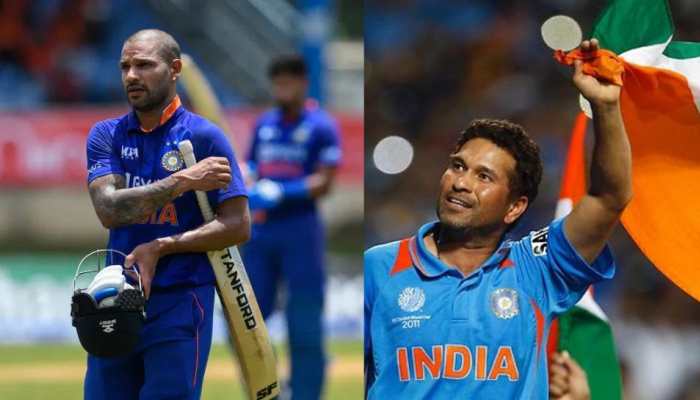'Impeachment' motion was filed to intimidate CJI and other judges, says Arun Jaitley
Rajya Sabha Chairman M Venkaiah Naidu had on Monday had rejected the notice by seven Opposition parties to impeach CJI Dipak Misra.
Trending Photos
) Pic courtesy: Twitter/@arunjaitley (File photo)
Pic courtesy: Twitter/@arunjaitley (File photo) New Delhi: Union Finance Minister Arun Jaitley hit back at the Congress, saying that the misconceived motion for the 'impeachment' of the CJI was just one example of the growing tendency of lawyer-MPs to drag intra-court disputes into the Parliamentary process to help different interests.
He also said that the Parliament was supreme in its own jurisdiction and its process cannot be subjected to judicial review and 'impeachment' motion was filed on untenable grounds for a collateral purpose to intimidate the CJI and other judges.
Following is the full text of Jaitley's Facebook post titled - Why the malafide impeachment motion was bound to fail?:
Business persons and industrialists have frequently been accused of attempting to influence policy by using parliamentary processes. Some motivated questions are raised and letters are written by Members of Parliament at the behest of business interests. These were conventionally the traditional methods deployed in trying to use Parliamentary processes to help business interests. Many of these tactics stood exposed and over the years the system was able to analyse and distinguish some of these subtle and blatant attempts. The new phenomenon seems to be somewhat different. A very large number of eminent lawyers are now Members of Parliament. Most political parties have given nominations to some of them since their value, both in court and Parliamentary debates, is significant. The incidental impact of this has been a growing tendency of lawyer members to drag intra-court disputes into the parliamentary process. The misconceived motion for the impeachment of the Chief Justice of India is just one example of this.
Why misconceived?
An impeachment motion was intended to be filed in the rarest of rare cases. These cases would include those where a “gross misconduct” has been indulged in by a delinquent judge during his tenure as a judge. There has to be strong and hard evidence to substantiate this. Hearsay and rumours are not a substitute for evidence. The present impeachment motion has been filed on untenable grounds. It has been filed for collateral purpose to intimidate the Chief Justice of India and other judges of the highest judiciary. The Congress Party is capable of dragging the judges into an unsavoury controversy and make them controversial, should their judicial opinion not appear favourable in the cases in which the Party has an interest. To any political analyst, it was clear that the impeachment motion would never get the support of two-thirds majority in both Houses of Parliament. The Congress party knew this. Its object was not the passage of the Motion but intimidation of India’s judiciary.
A poorly drafted motion
Unquestionably the impeachment motion was poorly drafted. The level of proof required to impeach a judge of being guilty of “proved misbehaviour” has to be proved “beyond a reasonable doubt”. Any inquiry set up subsequent to a possible admission of a motion cannot be a fishing and roving inquiry. The inquiry does not have to search for better evidence or a better set of facts. The motion must contain a definitive case which makes out a case “beyond reasonable doubt” that the judge is guilty of “proved misbehaviour”.
Charge 1: When the 64 Members of Parliament present a best-case scenario that the Chief Justice of India “may have been involved in the conspiracy of paying illegal gratification”, can it be said that this makes out a possible case if accepted in totality, one of proof “beyond a reasonable doubt”?
Charge 2: When 64 Members of Parliament at best allege that the Chief Justice of India “was likely to fall within the scope of the investigation”, it is not mere conjecture or a surmise rather than a case “beyond a reasonable doubt”?
Charge 3: When the Members of Parliament allege that the Chief Justice of India “appears to have anti-dated an administrative order”, is it not mere suspicion or an assumption rather than a charge “beyond a reasonable doubt”?
Charge 4: Can a 33-year-old allotment of land to an advocate be a “proved misbehaviour” against Chief Justice of India?
Charge 5: Can a different or an alternative view on the allocation of cases by the Chief Justice of India be a case of “proved misbehaviour”. The Congress party’s argument that they are making vague allegations which can only be proved in an inquiry is not tenable. Vague and unsubstantiated allegations can never be a basis of a roving fishing inquiry against the holder of a high office.
A suicidal future move of the Congress
The Congress party has indicated that it would now challenge the order of the Chairman, Rajya Sabha declining to admit the motion, before the Supreme Court. In parliamentary practice, several types of motions and resolutions are proposed under the Rules of Business. The Chairman/ Speaker of the either Houses of Parliament has the sole discretion whether to admit the motion or to decline to do so. The power to admit or to decline a motion is part of the legislative process of Parliament. A motion under Article 124(4) is no different from any other motion where Chair has the discretion to admit it or decline to do so. There is a conventional view that the exercise of the discretion by the Chair of either House is not justiciable in the court of law. This view gains support from the observations made in the majority opinion of Justice JS Verma in the 1992 case (Sarojini Ramaswami vs UOI) where the court held:
“On initiation of the process in the prescribed manner, the Speaker/ Chairman is to decide whether the accusations require investigations. If he chooses not to act on the accusations made in the form of a motion by a minimum number of Members of Parliament, the matter ends there”. For the Congress Party to carry forward its mistake of subjecting legislative processes to judicial review would be a blunder. The Parliament is supreme in its own jurisdiction. Its process cannot be subjected to judicial review.
Rajya Sabha Chairman M Venkaiah Naidu on Monday had rejected the unprecedented notice by seven Opposition parties led by the Congress to 'impeach' CJI Dipak Misra on five grounds of 'misbehaviour', saying the allegations were neither "tenable nor admissible".
PTI had quoted sources as saying that Naidu had arrived at the decision based on the opinion of top legal and constitutional experts, including former secretary generals of Lok Sabha and other legal luminaries with whom he held extensive consultations. He had also taken the views of top legal and constitutional experts, including former chief justices and judges, over the past two days before taking the decision, the news agency had further quoted sources as saying.
"I have considered the material contained in the notice of motion and reflected upon the inputs received in my interaction with legal luminaries and constitutional experts, I am of the firm opinion that the notice of motion does not deserve to be admitted," Naidu had said in the order. "I refuse to admit the Notice of Motion," he had added.
"Clearly this is an internal matter to be resolved by the SC itself. Going through the five allegations mentioned in the notice, I am of the view that they are neither tenable nor admissible," the VP had further said in his order.
Leaders of seven Opposition parties had on Friday last met the Vice President and had handed over the notice of impeachment against the CJI bearing signatures of 64 MPs and seven former members, who had recently retired.
Stay informed on all the latest news, real-time breaking news updates, and follow all the important headlines in india news and world News on Zee News.
Live Tv







)
)
)
)
)
)
)
)
)
)
